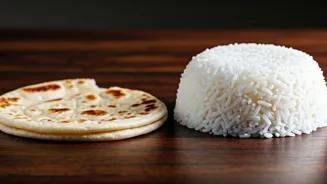Digestive Differences Explored
The primary concern when choosing between roti and rice for dinner is how efficiently your body processes them. Roti, made from wheat flour, is a staple
in Indian cuisine and contains a good amount of fiber. Fiber aids digestion by promoting regular bowel movements and preventing constipation. Rice, especially white rice, has less fiber content, which means it can be easier to digest for some people. However, this also means that white rice might not keep you feeling full for as long. Brown rice, on the other hand, retains its bran layer and offers more fiber than white rice, making it a closer contender to roti in terms of digestive benefits. The speed at which each food digests can affect your sleep quality, since the digestive process can keep you up if it’s too taxing on your system at night. Individuals vary, of course, some may find roti easier to digest while others may have a sensitivity to gluten, a protein found in wheat, and so may find rice a better choice. Considering your individual needs is key when deciding on your ideal nighttime dinner.
Roti's Nighttime Impact
Roti's fiber content, while beneficial for overall digestion, might present a mixed bag at night. The fiber can keep you feeling fuller for a longer period, potentially helping to stave off late-night cravings, which is a positive aspect. However, the digestive system has to work harder to break down the fiber, which could lead to some discomfort or bloating for certain people, especially if they have a sensitive stomach. Furthermore, the gluten in roti can be an issue for people with gluten sensitivities. If digestion is not ideal at night, it can interfere with sleep quality. Some individuals may find that the heavier feeling of roti, especially when consumed with other rich foods, makes them feel sluggish and uncomfortable. Portion control is important, too; eating a large amount of roti close to bedtime may overload the digestive system and lead to a less restful night. In light of these considerations, it's very important to assess how your body responds to roti at night to find whether it suits you.
Rice's Nighttime Effect
Rice, in contrast, often gets a reputation for being easier on the stomach, particularly white rice. Its lower fiber content means it’s digested more quickly than roti, which can be advantageous if you're aiming for a lighter dinner. The quicker digestion may help avoid the heavy feeling that can disrupt sleep, making it a potential good choice for those prone to digestive issues at night. Nevertheless, this speed of digestion also has a downside. Because white rice lacks fiber, it doesn't keep you full for as long as roti. This could lead to feeling hungry again sooner. Brown rice, with its fiber, offers a better balance of benefits. It offers the fiber content, like roti, supporting regular digestion and keeping you satisfied. However, the high glycemic index of rice, whether white or brown, could also trigger a blood sugar spike followed by a crash, possibly affecting your sleep quality. Therefore, when considering rice for a night meal, understanding your body's reaction to it is crucial, and choosing the type of rice is a factor, alongside the quantity you consume.
Making a Wise Choice
Ultimately, selecting between roti and rice for a night meal depends on your individual health requirements and personal preferences. If you often experience bloating, discomfort, or have gluten sensitivities, rice, particularly white rice, might be a better choice. It is easily digestible and less taxing on the stomach. For those who are fine with gluten and need to increase their fiber consumption, roti and brown rice can be beneficial. They promote regular bowel movements and keep you full for longer. Consider factors like your activity levels, the time you eat dinner, and any digestive issues you may have. Additionally, the way you prepare and consume these foods is essential. Avoid heavy spices and greasy add-ons that might add to digestive discomfort. Experimenting with different options and observing how your body reacts is the best way to determine the ideal dinner. It's important to consult with a doctor or a registered dietitian for personalized dietary advice. They can consider your unique health needs and guide you to make the best choice for your digestive comfort and sleep quality.


















